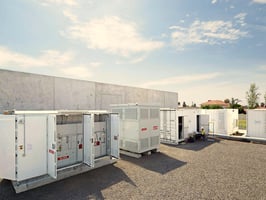At Kinsley Energy Systems, we deliver cutting-edge energy solutions—from combined heat and power to...
Why Batteries for Datacenters in 2025?
The Perfect Storm: A New Era of Datacenter Power
Datacenters have always been the backbone of the digital world, but 2025 presents a new challenge. The AI revolution is fueling exponential growth in datacenter energy demand, while at the same time, grid instability, rising energy costs, and sustainability mandates are pushing operators to rethink their power strategies. Traditional power solutions alone are no longer enough—battery energy storage systems (BESS) are stepping in to transform the industry.
Resiliency: Ensuring Uninterrupted Performance
With increasing power outages and grid instability, datacenters cannot afford downtime. BESS provides instantaneous power during grid failures, bridging the gap between power loss and generator startup. Unlike traditional backup generators, which take time to ramp up, batteries carry the load immediately, eliminating inrush and transient concerns that can disrupt operations.
By integrating battery storage with generators in a hybrid system, datacenters can significantly enhance redundancy and reliability. This means even in an emergency, operations remain smooth without compromising performance.
Stability: Improving Power Quality
Power fluctuations can be detrimental to sensitive computing environments. Batteries not only provide emergency backup but also enhance power stability by reducing transient loads and improving power quality. The ability to store and dispatch energy instantly allows datacenters to maintain seamless operations, regardless of grid inconsistencies or equipment load shifts.
Sustainability: The Pathway to Net Zero
In 2025, sustainability is no longer optional—regulatory pressures and corporate ESG commitments are pushing datacenters toward carbon reduction strategies. Battery energy storage plays a pivotal role in this transition by enabling time-of-use dispatch, optimizing renewable energy consumption, and reducing reliance on fossil fuels.
By storing excess renewable energy during off-peak hours and discharging it when needed, BESS helps datacenters lower their carbon footprint while also cutting operational costs. Additionally, batteries are future-fuel ready, ensuring that as cleaner energy technologies evolve, datacenters remain ahead of the curve.
Cost Savings: Efficiency and Fuel Optimization
Datacenters are power-hungry, and energy expenses are a major concern. Battery systems optimize fuel consumption in hybrid power setups, reducing the amount of diesel or natural gas needed to keep operations running. This not only cuts costs but also minimizes emissions.
Additionally, with short deployment lead times, battery systems are a practical investment. A hybrid system incorporating batteries can be on-site within six months and fully operational within a year, providing a fast-track solution for growing datacenter power demands.
A Future-Ready Power Strategy
The demand for datacenter energy will only continue to rise in the coming years. Grid capacity limitations, combined with the pressure to reduce emissions, make battery energy storage an essential part of the power equation. By integrating batteries into their energy strategies, datacenters can achieve a balance of resiliency, stability, sustainability, and cost efficiency.
For industry leaders, the question is no longer if they should invest in battery solutions—it’s how fast they can implement them to stay ahead in the evolving digital landscape.


.jpeg?width=50&name=img_1043%20(2).jpeg)

